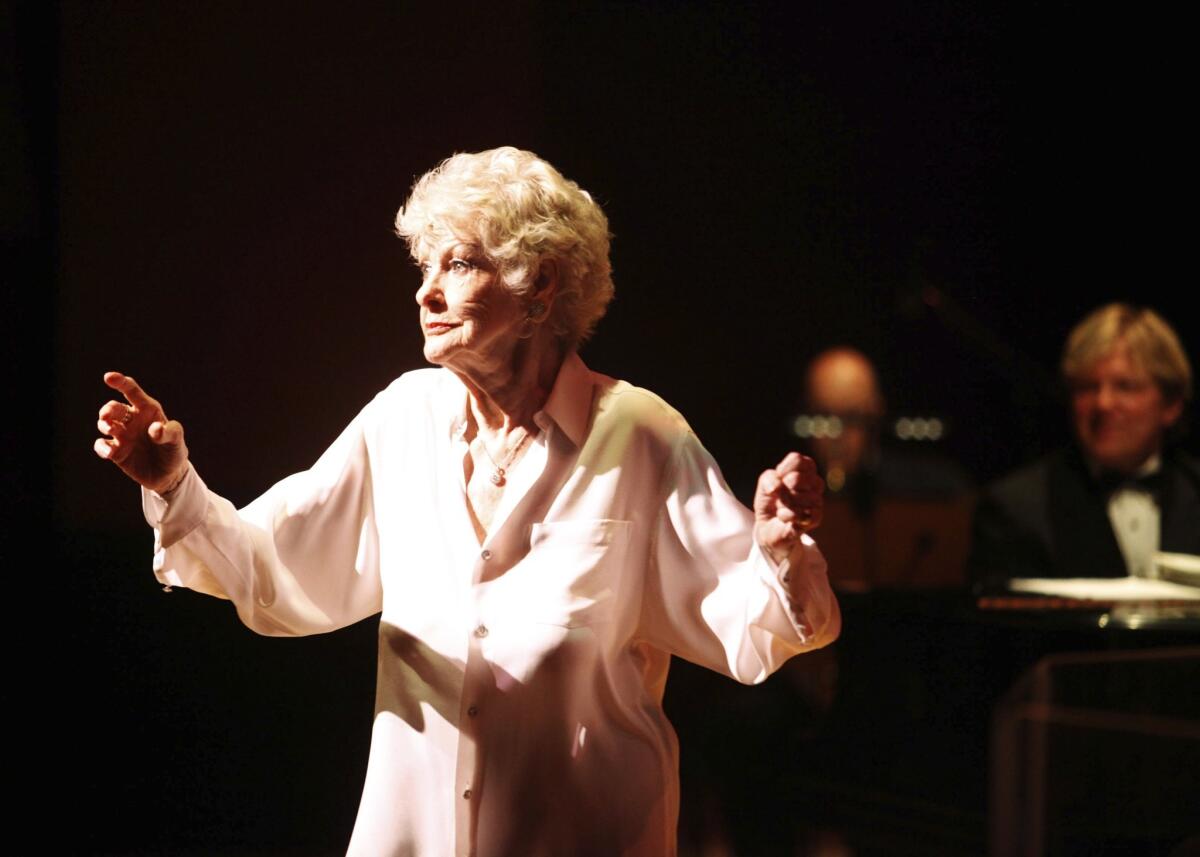Elaine Stritch dies at 89; Broadway actress had blue-collar attitude

Elaine Stritch, the raspy-voiced actress whose forceful personality and salty language enlivened the New York stage for more than six decades, died Thursday at her home in Birmingham, Mich. She was 89.
Her death was confirmed by her friend, Julie Keyes, who cited age-related illnesses as the cause.
In a lengthy theater career whose ups and downs included a Tony-winning one-woman show, collaborations with Stephen Sondheim and Edward Albee, and a debilitating but ultimately successful battle with alcoholism, Stritch had a temperament that was outsized even by Broadway standards.
She made few apologies in her career, describing herself as a “Catholic, diabetic, alcoholic, pain in the ass.”
Her long fight with the bottle formed a narrative corner for her 2002 one-woman Broadway show “Elaine Stritch at Liberty,” which won a Tony. She was nominated four other times, for best actress.
The autobiographical production, part of a late-career resurgence, was later filmed for HBO, winning her an Emmy Award.
“In my time, I have been known to lift a few,” she joked at the top of the show in her signature mix of self-deprecation and blunt honesty.
She opened up further in the 2014 documentary “Elaine Stritch: Shoot Me,” which revealed memory problems and health issues in recent years.
If most stage entertainers of her generation aspired to a kind of genteel elegance, Stritch preferred something a good deal earthier. Her public persona was that of the no-nonsense, combative grande dame with a blue-collar attitude.
“I suspect Elaine Stritch won’t know how to rest in peace!” said Mia Farrow on Thursday, adding that her co-star in director Woody Allen’s 1987 movie “September” was a “force of nature.”
Born in Detroit on Feb. 2, 1925, to devoutly Catholic parents, Stritch chafed against the strictures of the church and middle-class life. She moved to New York at 17 to pursue an acting career.
“My biggest dream was to get out of Michigan — to discover life beyond the Sacred Heart Convent,” she once said.
In New York, Stritch studied drama at the New School for Social Research, where one of her classmates was Marlon Brando, whom she briefly dated.
After cutting her teeth in classical theater, Stritch made her Broadway debut in 1946 with the play “Loco,” which ended up being a flop. Six years later at the age of 26, she was a bona fide stage star in the Rodgers and Hart musical “Pal Joey,” in which she performed the number “Zip,” a song that she would incorporate into her solo repertoire.
She received her first Tony nomination in 1955 for the original Broadway production of the play “Bus Stop,” by William Inge, in which she appeared opposite Kim Stanley.
The actress later befriended Noel Coward, who affectionately called her “Stritchy” and who cast her in his musical “Sail Away” in 1961.
“I had more fun with [Coward] than anybody in the world,” she told the Los Angeles Times in 2012. “That makes you skip down the street to a rehearsal; he was my upper.”
Her singular singing voice has been affectionately compared to a car shifting gears without the clutch, and a combination of sand and glass in a blender.
Still, Stritch managed to succeed in musical theater by gravitating toward parts that required her to play variations of her loud, brassy self.
Her biggest musical hit came in 1970 in the original Broadway production of Sondheim’s “Company,” in which she played Joanne, a boozy cynic with man problems. Her rendition of the song “Ladies Who Lunch” became a calling card for the actress.
Later in her career, another Sondheim number, “I’m Still Here” from the musical “Follies,” became her personal anthem of survival that she performed at concerts and recitals.
She appeared in the original London production of “Company” in 1972 and made the city her home for several years, appearing in numerous stage productions and a handful of television shows.
Her stage career faltered in the ‘80s following the death of her husband, actor John Bay, in 1982. The couple had no children, and Stritch left no immediate survivors.
After her husband’s death, the actress moved back to New York and took increasing solace in drinking.
During this period, she landed her biggest screen role to date in “September,” earning critical acclaim as an emotionally callous former screen star unable to reconcile with her adult daughter.
As recounted in “At Liberty,” Stritch suffered a severe hypoglycemic attack following a wrap party for the movie. She survived and resolved to get sober.
Her Broadway resurgence came in the ‘90s with productions of “Show Boat” and especially a 1996 revival of Albee’s drama “A Delicate Balance,” for which she received a Tony nomination for playing Claire, another alcoholic, to add to her menagerie of washed-up dames.
“Stritch gives another one of those performances-of-a-career in a career already stuffed with them,” wrote critic Vincent Canby in the New York Times.
The reviews were even better when “At Liberty” — co-written by New Yorker critic John Lahr — debuted in 2001 at the Public Theater in New York.
“She flaunts the most cunningly calculated spontaneity, the most dazzlingly mimed extemporizing I have ever experienced,” wrote John Simon in New York magazine.
The show opened on Broadway in 2002. A year later, the New York Landmarks Conservancy declared the actress a Living Landmark.
She made a few stage appearances in L.A. during her career. She starred opposite Laurence Harvey in a 1963 bomb titled “Time of the Barracudas.” In 2012, she performed a recital of Sondheim songs at Walt Disney Concert Hall.
Stritch continued to work well into her late 80s. In 2009 she appeared in a production of “The Full Monty” at the Paper Mill Playhouse in New Jersey.
Her final Broadway role was in 2010 in the revival of “A Little Night Music,” in which she replaced Angela Lansbury in the role of Madame Armfeldt.
Stritch made memorable screen appearances portraying domineering matriarchs in the NBC sitcom “30 Rock,” as Alec Baldwin’s mother, and in the 2005 movie “Monster-in-Law,” playing Jane Fonda’s antagonistic mother-in-law.
In recent years, Stritch performed a regular cabaret act at New York’s Carlyle Hotel, where she was a longtime resident. The actress returned to live in her native Michigan in 2013, citing her health.
More to Read
Start your day right
Sign up for Essential California for the L.A. Times biggest news, features and recommendations in your inbox six days a week.
You may occasionally receive promotional content from the Los Angeles Times.






